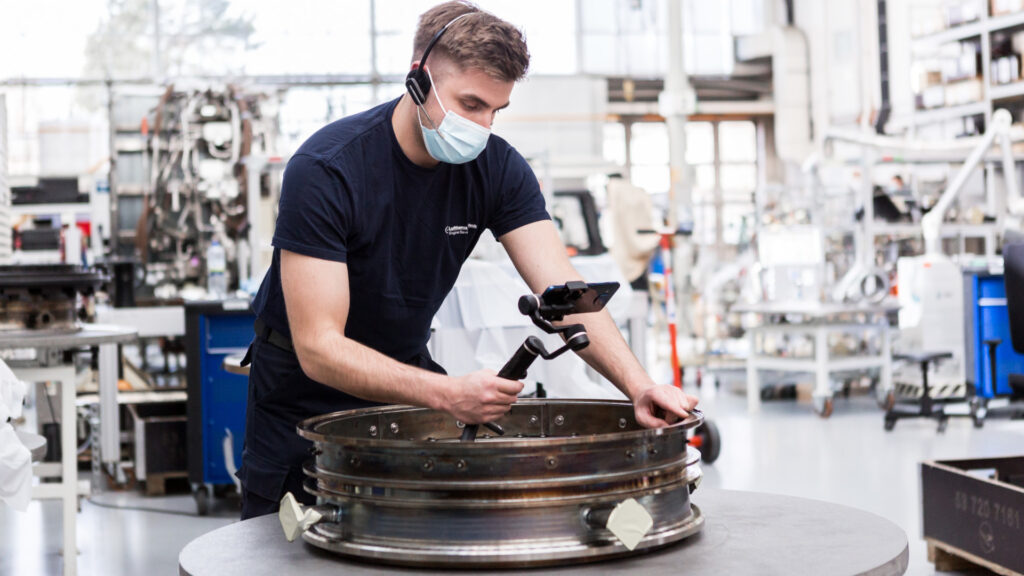 More than two years ago, Lufthansa Technik was one of the first industrial companies in Germany to start setting up so-called campus networks based on the latest mobile communications standard 5G. Based on the excellent experience in the engine services business unit, the 5G network there has now been extended to a second overhaul workshop. As a result, additional customers can now witness their engine layovers remotely via the AVIATAR platform. Any interference with flight operations, which was recently the subject of controversy in the United States, can be ruled out at the Hamburg base.
More than two years ago, Lufthansa Technik was one of the first industrial companies in Germany to start setting up so-called campus networks based on the latest mobile communications standard 5G. Based on the excellent experience in the engine services business unit, the 5G network there has now been extended to a second overhaul workshop. As a result, additional customers can now witness their engine layovers remotely via the AVIATAR platform. Any interference with flight operations, which was recently the subject of controversy in the United States, can be ruled out at the Hamburg base.
Lufthansa Technik had already been operating its own 5G campus network since 2020. At that time, it was used for the first time in a Hamburg workshop for aircraft engines, where the CFM56 and V2500 types are overhauled. Here, 5G made it possible to reliably use high-resolution video streams in the visual inspection of engine parts. In times of massive travel restrictions during the Corona crisis, this so-called “Virtual Table Inspection” (VTI) quickly advanced from a test project to a business-critical infrastructure, because customers no longer had to travel to Hamburg to have their engine parts inspected.
As this offering quickly became indispensable in daily operations, Lufthansa Technik fully integrated the 5G-powered VTI into its AVIATAR Digital Operations Suite in 2021. Recently, the network and services have now been extended to the second engine shop where LEAP* and CF6-80 engines are overhauled. The latter’s operators can now also interact remotely with the mechanics on-site in Hamburg, saving time and money while making important repair decisions for their engines. As such decisions often involve six-digit figures, the high video resolution and the stable, reliable and confidential connection to the customer at all times provided by 5G are essential for this offering.
The number of services using the 5G infrastructure has also increased in the meantime. Both overhaul workshops now offer borescopy examinations via the fast, dedicated campus network. The high-resolution video stream here provides customers with high-quality insights into even the most remote cavities and other hard-to-reach areas of their engines, from the other end of the world, if necessary. Here, too, the high video resolution made possible by 5G plays to its strengths, especially since digital measurements are also possible within the live-streamed borescopy. In one case, even the smallest scratch marks of just 0.3 millimeters in length were reliably identified.
“In the pandemic situation, virtual parts inspections and digital borescopies have clearly gained acceptance in our company. The 5G-based video streams have helped us enormously,” said Michael Kirstein, Vice President Operations Engine Services at Lufthansa Technik, adding, “In the past, such inspections often had to be planned several weeks in advance. Now we can schedule inspections at very short notice, which our customers really appreciate.”
Ten-year license from the German Federal Network Agency enables future expansion
To continue operating its own and independent 5G networks, Lufthansa Technik received a fixed ten-year license from the German Federal Network Agency (BNetzA) toward the end of 2021. This secures the independent application of this future technology at the Hamburg headquarters for the long term. This also means that nothing stands in the way of further expansion of the campus network there. Due to the promising properties of 5G technology, which Lufthansa Technik is largely free to configure for its own purposes, the company is already considering further possible applications in the advancing digitalization of the MRO (maintenance, repair and overhaul) business. One example of future applications is the localization of components, which could be significantly simplified with upcoming releases of the 5G standard.
“When selecting suitable network technology for digitization projects, it is advisable not to commit to a standard from the outset, but to evaluate specific use cases in an open-ended manner with regard to technology and manufacturers and then to address them with the best technology available at the time,” explains Dr. Claudius Noack, IT Consultant at Lufthansa Industry Solutions. The sister company accompanied the process at Lufthansa Technik in an advisory capacity from the very beginning and, based on the experience gained here, now supports companies around the world in rolling out their own 5G networks.
“We are very pleased with the opportunities 5G offers us and with the successful implementation,” adds Stephan Drewes, Head of Information Management at Lufthansa Technik. “Of course, we will only roll out this technology further and configure it to fit the specific requirements on-site where 5G demonstrably brings a technological or economic advantage over other wired or radio-based technologies, such as Wi-Fi 6, for the particular use case. In this regard, we place particular trust in the competent partnership with Lufthansa Industry Solutions.”
Interference between 5G network and flight operations ruled out here
Not least because the Hamburg base is directly adjacent to the Hanseatic city’s international airport, Lufthansa Technik also pays utmost attention to the operational security of its radio networks. Possible interference of 5G technology with flight operations, as has recently been the subject of controversial discussion, especially in the United States, is ruled out at the Hamburg base simply because of the frequency bands used in Europe.
The frequency band used by Lufthansa Technik is between 3.7 and 3.8 GHz. Compared with the public 5G band (3.7 to 3.98 GHz) in the United States, the safety margin to the frequency band used by radar altimeters on commercial aircraft (4.2 to 4.4 GHz) is twice as large here. Moreover, Lufthansa Technik has so far employed 5G technology exclusively inside industrial buildings, which, with their high steel and concrete content, massively shield all wireless networks from the outside world.
Due to its own high safety standards, Lufthansa Technik has had BNetzA document the clearance of its 5G network with a so-called site certificate, although this is not actually mandatory given the performance of the 5G antennas used here. In addition, measurements were carried out at the Hamburg base in February 2022 in collaboration with the technology company Rohde & Schwarz. The company’s world-renowned experts in mobile network quality measurements were unable to detect any 5G signals outside the areas designated for the campus network, with the network scanner used being significantly more sensitive than a cell phone and registering even the weakest signals.
* LEAP engines are a product of CFM International, a 50/50 joint venture between GE and Safran Aircraft Engines.
About Lufthansa Industry Solutions:
Lufthansa Industry Solutions is a service company for IT consulting and systems integration. The Lufthansa subsidiary supports its customers in the digital transformation of their companies. Its customer base includes companies within the Lufthansa Group as well as more than 300 companies in various industries. Headquartered in Norderstedt, the company employs more than 2,100 people at several offices in Germany, Albania, Switzerland and the USA.
About Lufthansa Technik:
With some 35 subsidiaries and affiliates, the Lufthansa Technik Group is one of the leading providers of technical aircraft services in the world. Certified internationally as maintenance, production and design organization, the company has a workforce of more than 20,000 employees. Lufthansa Technik’s portfolio covers the entire range of services for commercial and VIP/special mission aircraft, engines, components and landing gear in the areas of digital fleet support, maintenance, repair, overhaul, modification, completion and conversion as well as the manufacture of innovative cabin products.
All images credited to Lufthansa Technik











